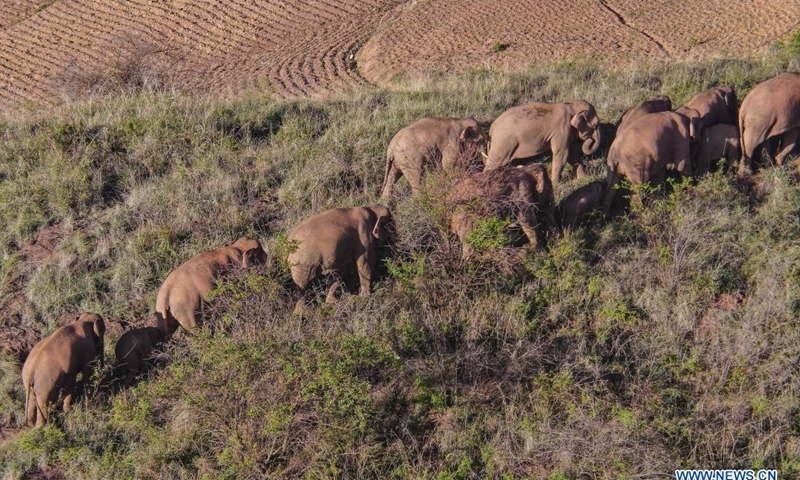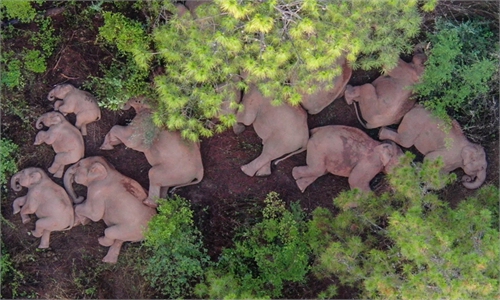
Aerial photo taken on June 19, 2021 shows a herd of wild Asian elephants in Dalongtan Township of Eshan County, Yuxi City, southwest China's Yunnan Province. From June 18 to June 19, China's famous herd of wandering elephants has headed 3.09 km southwest and continued to linger in Dalongtan Township of Eshan County. (Photo:Xinhua)
In the past three days, the wild Asian elephant herd in Southwest China’s Yunnan Province has halted its northward migration and is instead traveling southwest toward its original habitat. Experts noted that the herd has now shown a trend of return and southward migration, but the time and route remain uncertain.
On Friday, the elephants left Yimen county, where they have wandered for more than 10 days, and entered Eshan county. From 6 pm Friday to 6 pm on Saturday, the herd generally migrated 3.09 kilometers to the southwest.
This is the second day in the past three days that the herd headed southwest instead of north or northwest, its original direction. Their original habitat, the Xishuangbanna Nature Reserve, is to the southwest.
The herd left Xishuangbanna in March 2020, and paused for several months when one of the herd gave birth, which was in their normal range. They started their northward trek on April 16, which was an abnormal move. Local experts said the herd now looks to be returning south, but there is no way to know when and by which routes it will return.
Experts told the Global Times that the herd will not be able to return its habitat in the near future as it has moved too far from its original habitat. As Yunnan has entered the rainy season, crossing rivers may be difficult.
"Although elephants can swim, considering there are several baby elephants in the herd, it’s likely they will avoid crossing rivers to protect the young," Zhang Li, a wildlife biologist and professor of mammal conservation at Beijing Normal University, told the Global Times.
Satellite video shows the herd passing a small river on a mountain as it descended on Saturday. After a brief stop, the herd squeezed through a narrow channel on the river rather than swim across.
By testing the elephants’ dung, conservationists found that the elephants have recently taken in tree bark other than their usual diet of corn and sugar cane.
The lone elephant that previously left the herd has been away from the herd for 14 days and is currently to the northeast of the herd, 24.9 kilometers away, wandering at the edge of woodland near the neighboring city, Anning.
Experts said the lone elephant is not organized and disciplined, thus it is more likely to enter villages to find food. This has increased the risk that a person could be injured, so it is necessary to monitor it closely.
Yunnan Provincial Forestry and Grassland Bureau has established a duty system for the herd safety precautions, and additional personnel have been assigned. Seventeen drones are used for non-stop monitoring to help guide the elephant herd to the southwest.



